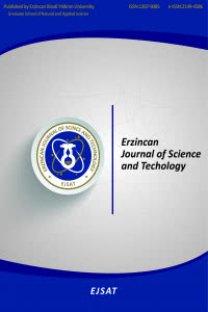Bigadiç Kolemanitin Tozaltı Kaynak Toz Bileşeni Olarak Kullanılabilirliği
toz altı kaynak tekniği, Bigadiç kolemanit, kaynak metali, kaynak tozu
Usability of Bigadic Colemanite as Submerged Arc Welding Powder Component
___
- Başar, G., Buldum B.B., Sugözü İ.,2018.‘’Kolemanit ve Boraks Takviyeli Fren Balatalarının Sürtünme Performansı’’, El-Cezerî Fen ve Mühendislik Dergisi, (El-Cezerî Journal of Science and Engineering) Cilt: 5, No: 2, (635-644).Bideci, Ö. S.,bideci, A., 2018. ‘’Öğütülmüş Kolemanit Katkısının Çimento Harçlarına Etkisi’’, Fırat Üniv. Müh. Bil. Dergisi (Science and Eng. J. of Fırat Univ.) Cilt 30(1), 133-138.Çiftçi, H., Atik, S., 2015.’’Kolemanit Artığının Mekanik Aşındırma ve Isı ile Dağıtma Yöntemleri ile Zenginleştirilmesi’’, Suleyman Demirel University of Journal of Natural and Applied Science Cilt 19(1), 57-62.Davis, J.R., 1993. “ASM Handbook: Welding, Brazing and Soldering, Vol.6, ASM International, USA.
- Eskibalci M.F., Ozkan S.G. 2012. ‘’An investigation of effect of microwave energy on electrostatic separation of colemanite and ulexite’’ Minerals Engineering, vol.31, 90–97.
- Gül A.,Kaytaz Y.,Önal G. 2006. ‘’Beneficiation of colemanite tailings by attrition and flotation’’, Minerals Engineering, vol.9, issue 4, 368–369.http://www.etimaden.gov.tr/kolemanit (19 Kasım 2018).
- Külahlı E. (1988). ‘’Kaynak Bilimi’’, Oerlikon Yayını, Sayı-2.
- Lehto, P., Remes, H. ,Saukkonen, T. ,Hänninen, H. ,Romanoff, J., 2014. ‘‘Influence of grain size distribution on the Hall–Petch relationship of welded structural steel’’, Materials Science and Engineering: A Volume 592, , Pages 28-39.
- Liu, M.Y., Shi, B., Wang, C., Ji, S.K., Cai, X., Song, H.W., 2003. ‘’Normal Hall–Petch behavior of mild steel with submicron grains’’, Materials Letters, vol.57, 2798–2802.
- Ruşen A.,Geveci A.,Topkaya Y.,2012. ‘’Minimization of copper losses to slag in matte smelting by colemanite addition’’ The 17th International Symposium on Boron, Borides and Related Materials, Vol.14, Issues 11–12, 1702–1704.
- Savaşkan T. 2009, Malzeme Bilgisi ve Muayenesi, Genişletilmiş 5.Baskı Trabzon.
- Sivrikaya O., Arol A.İ. 2012. ‘’The bonding/strengthening mechanism of colemanite added organic binders in iron ore pelletization’’, İnternational Journal of Mineral Processing, vol.110–111, 90–100.
- www.askaynak.com (19 Kasım 2018)
- www.gedikkaynak.com.tr (19 Kasım 2018)
- www.oerlikon.com.tr (19 Kasım 2018)
- Zhao, M.C., Hanamura, T. Qiu, H. Nagai, K. , Yang, K.,2006. ‘’Grain growth and Hall–Petch relation in dual-sized ferrite/cementite steel with nano-sized cementite particles in a heterogeneous and dense distribution’’, Scripta Materialia vol.54, 1193–1197.
- ISSN: 1307-9085
- Yayın Aralığı: 3
- Başlangıç: 2008
- Yayıncı: Erzincan Binali Yıldırım Üniversitesi, Fen Bilimleri Enstitüsü
Türkiye’de İnşaat Mühendislerinin Mobbing Algılarının Belirlenmesi Üzerine Bir Çalışma
Hasan Basri BAŞAĞA, Ünsa KARAL, Bayram Ali TEMEL
SEM, XRD ve EDX yöntemleriyle insan aort kapaklarında kalsiyum mineralizasyon analizi
Padovan-circulant-Hurwitz Dizilerinin m Modülüne Göre Periyotları
Zafer ADIGÜZEL, Özgür ERDAĞ, Ömür DEVECİ
Deniz OZONUR, Duygu KILIÇ, Hatice Tul Kubra AKDUR, Hülya BAYRAK
Basınçsız ve Spark Plazma Sinterlenmiş Si3N4 Kompozitlerin Özelliklerine SiC’ün Etkisi
Zeynep TAŞLIÇUKUR ÖZTÜRK, Cem ŞAHİN, Nilgün KUŞKONMAZ
Şule CEYLAN, Resul YARAR, Yasemin CAMADAN, Özlem SARAL, Özge ÖZŞEN
Serbest Metabelyen Lie Cebirlerinin Direkt Toplamlarının Test Elemanları
